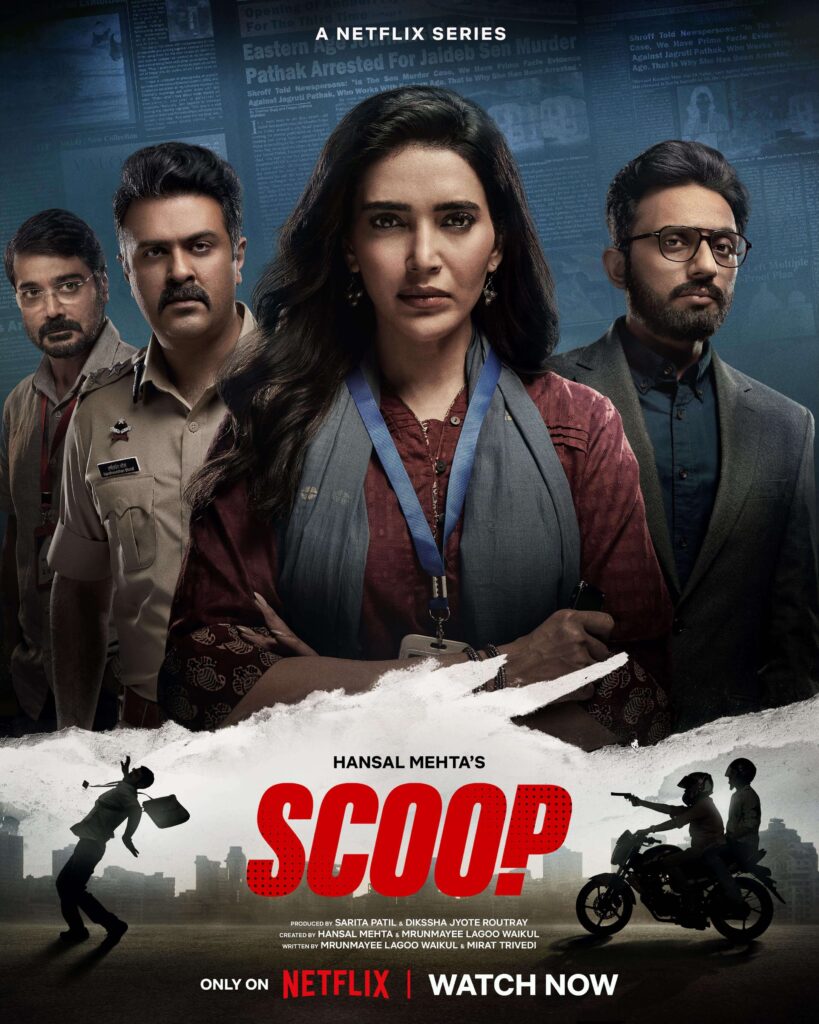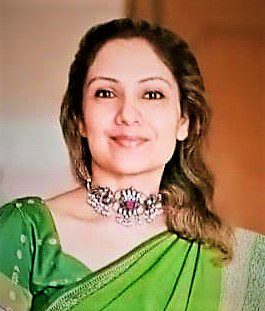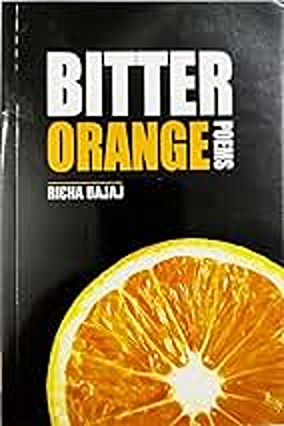In 2011, Mumbai crime reporter Jigna Vora faced a court case, inspiring the Netflix web series Scoop. A review by Urna – exclusively for Different Truths.

The high-profile court case of Mumbai-based crime reporter Jigna Vora inspired Hansal Mehta’s much-discussed new India-released Netflix web series, Scoop. Refresh your memory a little bit, folks, and you’ll remember how in 2011, Jigna Vora was charged for allegedly conspiring with gangster Chhota Rajan in the murder of another eminent journalist, Jyotirmoy Dey. Jigna Vora was eventually acquitted of all the charges in 2018, but not before she went through a 7-year ordeal for justice. So, the question is, why must we all watch Scoop now, in 2023?
Scoop is a spine-chilling, fictionalised to a large extent, and dramatised account based on true events crisscrossing and intersecting the worlds of journalism, the Mumbai Police, and the terrifying Mumbai underbelly, or the blood-curdling underworld, as we know. What’s more, it’s witty, compelling, and holds its power in portraying the shocking media polarisation and what it takes for the proverbial cookie to crumble, in a way that it’s never been said, done, or told before. At least, in the Indian OTT context.
The story is gutsy and spunky …
The story is gutsy and spunky, with a pace that can only be described as “unstoppable—a perfect recipe for an unapologetic, unabashed weekend binge. Yes, and if you want to deep-dive into the spiralling layers of speculation, mind games, and why and how a reporter becomes reported, I suggest you switch your phones off and cancel any plans that might eat into the immersive experience of Hansal Mehta’s goose flesh generating Scoop.
Karishma Tanna, who plays Jagruti Pathak, has done a commendable job as she deftly explores the highs and lows of a middle-class Gujarati girl, who grapples with intense ache when the very eco-system that forces her to chase one front-page story after another, crumbles upon her very own head like a stash of Jenga blocks. And how quickly her fraternity turns against her—the classic case of the protector turning into a predator, baying for her blood.
Mohammad Zeeshan Ayyub, as the idealistic editor boss who can see the slow, festering rot of journalism—supposedly the fourth pillar of democracy—does a brilliant job too. Ayyub, to me, is the quintessential stuff that mentors are made of and reminded me of many of my own fabulous bosses, seniors, and mentors, who always have my back.
Harman Baweja, … deftly holds up the greys of the conflicted supercop…
Harman Baweja, though completely unrecognisable, deftly holds up the greys of the conflicted supercop who negotiates between a rock and a hard place, with unmistakable finesse. And somehow, you don’t know whether to hate him more or love him more. While Prosenjit Chatterjee, the veteran Bengali actor, in a special appearance plays the senior journalist whose death sets the ball rolling and makes his role stand out for much more than its duration, with conviction and gravitas.
The rest of the characters, too, add to the depth, dimensions, and nuances of the narrative. Though a bit slow to cook initially but built in a methodical way to blow your mind off, Scoop is not just any other web series, but a brutally honest commentary on the fickle, unpredictable, and capricious nature of our times.
Without giving away any spoilers, Scoop is in many aspects factually drawn from Jigna Vora’s non-fiction book ‘Behind Bars in Byculla: My Days in Prison’ presented by the irrepressible former investigative journalist and author, S. Hussain Zaidi. Far from being just a prison memoir, Scoop almost consciously chooses not to be the Indian avatar of Orange Is the New Black. Jigna Vora’s plea for post-prison rehabilitation and the despicable state of our jails will yank your heart out of your rib cage as you palpably feel for Jagruti Pathak, Vora’s screen counterpart, as she struggles with her days in the Byculla Jail.
The genius of Scoop lies in how Hansal Mehta takes the story several notches higher …
The genius of Scoop lies in how Hansal Mehta takes the story several notches higher and pitches it to compel the viewer to think about the larger questions. Is ambition a dirty, despicable word when it comes to strong, professionally successful women? Can professional success and technical competency be trivialized at the drop of a hat, with a single callous, superfluous thought: a woman gets promoted when she sleeps with her boss? Must we be culture vultures, so prone to media-mediated narratives? Who then will pay the price of collateral damage to the individual crucified? Must we also be so quick and hasty to fall for instantaneous heroism and instantaneous vilification, as long as the front page or the breaking news packs a punch?

While the drama twists and turns with hedonism, from the internal politics of newsroom decisions to the horrifying murder of a senior crime reporter, from the interrogation rooms of the Mumbai cops, and then to the courtroom one-upmanship of what constitutes ‘fact’ as opposed to ‘fictionalised fact’, the cat and mouse chase begins to feel larger than life, and comes dangerously close to the bone, somewhere around the third or fourth episode.
The story may be as old as 2011, but … this isn’t old wine in a new bottle …
The story may be as old as 2011, but I assure you this isn’t old wine in a new bottle. Because as you start watching the six sharp, mind-bending episodes, you too will begin to feel that expanding lump at the base of your throat. And truth be told, the issue at the heart of the story is still a burning, fiery, explosive one—relevant for you, me, and for us collectively.
Sit back and ponder this for a minute. If a Deputy Bureau Chief and a crime journalist working at one of the most respected newspapers in the country could be so achingly vulnerable to a trial by the media, then who is safe? Who is immune? Who is protected?
Finally, what I loved about Scoop and for which the director, Hansal Mehta, must take a bow, is this: It’s the way Mehta humanises positions of power, authority, and accountability. Not with a gun loaded with bullets of judgment, but with a microscope fitted with the high-definition lens of empathy and understanding. And the gamut of hardships, the barrage of labels poking holes into one’s inner bastion, the whizzing conundrums, and the unrelenting pressures of being…at the top of your game. At the top of the same ladder of hierarchy that you – the individual, the person, the human – climbed tenaciously.
… thank you, Scoop, for reminding us all that … we are the same.
As Dag Hammarskjold, the Swedish economist, diplomat, and former Secretary-General of the United Nations, wrote, “Never measure the height of a mountain until you have reached the top. Then you will see how low it was”. That indeed hits home, and thank you, Scoop, for reminding us all that whether you are a super cop, a deputy bureau chief, a highly respected editor boss, a politician, or a mafia don – we are all the same.
Blood and bones. Tremors and tribulations. Frail and fragile. Human enough for the cracks to show when we break. And break we all do, don’t we? Albeit differently.
Picture from IMDb






 By
By
 By
By
 By
By
 By
By